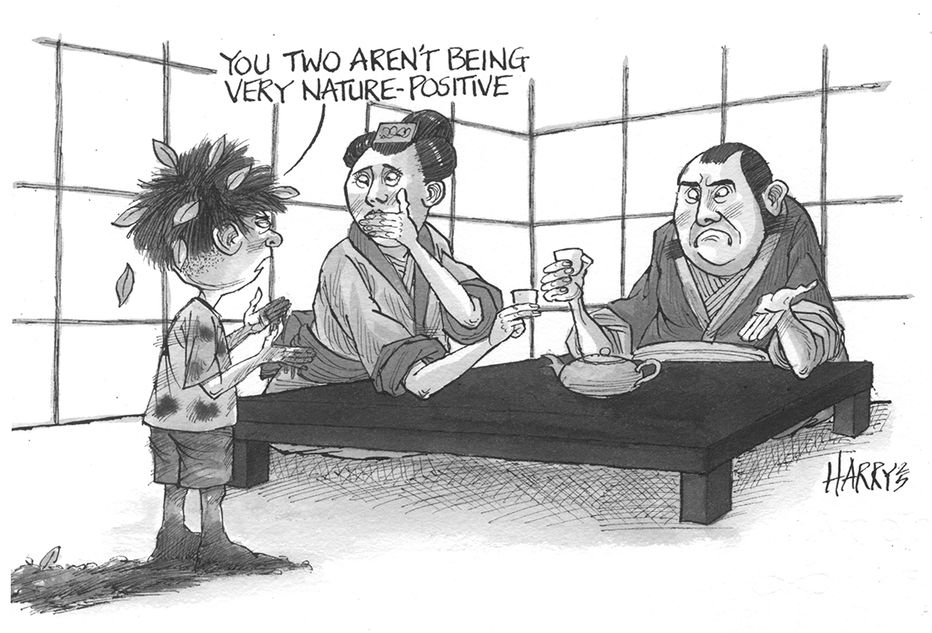REFILE- - Japan leads with nature lending

Japan has become one of the first countries globally to embrace nature-positive finance, a concept that was first discussed more than half a decade ago with the goal of halting and reversing nature loss by 2030.
Sumitomo Mitsui Trust Bank on February 28 launched a product which assesses what impacts the business operations of borrowers have on nature. Two days earlier, Tokyu Fudosan Holdings signed a ¥12bn (US$80m) nature capital impact finance loan that evaluates the Tokyo-listed real estate firm’s nature-positive endeavours and was sole lender Mizuho Bank’s first lending of this kind.
In late January, Heiwa Real Estate signed a ¥72bn 4.25-year borrowing with five lenders, including arranger Sumitomo Mitsui Banking Corp, in what was the mega-bank’s first natural capital management promotion and analysis loan.
Meanwhile, MUFG launched a new product called a natural capital management loan in November and is expecting to close its first deal soon.
Unlike green loans, nature impact loans do not have restrictions on the use of proceeds. As part of its loan, Tokyu Fudosan will plant trees and vegetation in central Tokyo and work to protect endangered forest frogs at its ski resort in Gunma prefecture.
Rating agency JCR provided a second opinion to Mizuho’s product, which aligns with the impact finance requirements published by Japan’s environment ministry, and the United Nations Development Program advised on the evaluation framework. JCR has also provided a second opinion to SMTB’s new product, which applies a two-pronged approach, improving the quality of nature-related disclosure in line with the Taskforce on Nature-Related Financial Disclosures Recommendations, a global initiative supported by governments, businesses and financial institutions, and the assessment of impacts on nature.
“As impact finance continues to expand, there is a growing movement among lenders to develop theme-specific impact finance products,” said Tomohiko Inamura, senior sustainable finance analyst at JCR. “Since the TNFD’s final recommendations were released in September 2023 and the subsequent initiation of corporate disclosure efforts, I think these lenders have been considering impact finance for natural capital.”
Asami Awata, head of the planning and control team at SMTB’s finance product solution department, said, “This assessment on the state of nature is a new and unique feature of the product, and the essential element of impact finance. The movement to disclose non-financial information in accordance with the TNFD Recommendations is currently gaining momentum.”
Japanese companies account for more than one-fourth of the over 500 committed organisations globally for adopting TNFD-aligned disclosure, according to the taskforce’s website.
“It is unknown how much it will increase overseas in the future, but I think Japan is ahead of the curve when it comes to TNFD and nature-positive,” said Shintaro Arai, another senior sustainable finance analyst at JCR.
“It is still unclear what should be disclosed and what should be done regarding biodiversity,” said Kazuhide Sano, head of the solutions group in SMBC’s sustainable solution department. “We launched this because we thought it would be a good entry product for companies that do not know what to do.”
Declining sustainable finance
The embrace of nature-positive finance comes as sustainable finance activity is on the decline in Japan. Sustainable loan volumes almost halved to US$18bn-equivalent in 2024 compared to the year before, according to LSEG LPC data. In particular, there are fewer new solar projects in the country, where they are no longer eligible for a special feed-in tariff introduced in 2021. Sustainable loan volumes had surged following the launch of the scheme to US$14.09bn, US$23.97bn and US$33.18bn in 2021, 2022 and 2023 respectively.
“Sustainable finance had become particularly popular over the past three years, and it felt a little overheated,” said Masaki Nomoto, senior vice president of the business promotion team in Mizuho’s sustainable products promotion department.
He said some of the top borrowers have not returned for refinancings as they do not feel the benefits are worth the costs.
Japan has seen an unusually high number of positive impact finance loans compared to the rest of the world, according to bankers.
The World Economic Forum is due to publish a report next month in collaboration with consulting firm Oliver Wyman outlining a practical approach for evaluating clients’ impact on nature, including nature-related indicators that provide a starting point for meaningful action.
However, there are concerns over potential “impact washing” as the impact is hard to measure.
“More people in the rest of the world are starting to feel like it is better not to call it sustainable finance or biodiversity because it will lead to accusations of greenwashing, depending on the borrower’s sector and country,” said SMBC’s Sano. “Japan is not yet there, though we remain cautious.”
Some borrowers prefer sustainable financings with unspecified use of funds rather than green or social loans which are tied to specific projects, according to bankers. In such instances, sustainability-linked loans or positive impact finance deals that comply with international principles are the natural choices.
“For those who want to be recognised that they are paying particular attention to natural capital management among other environmentally friendly initiatives, this type of themed products would fit better rather than loans with broader concept such as green loans,” said Naoya Orita, an expert in the sustainable business division of MUFG’s business promotion department.
According to Mizuho’s Nomoto, “one of the loan conditions that is important [for borrowers] is the flexibility of tenors. While SLLs have period constraints depending on the timing of the goals set by the borrowers, PIF allows for relatively flexible consideration of the loan terms in some cases.”
Bankers emphasised the importance of monitoring how borrowers are committed to make a proper impact on nature.
“We are particular about making products of top quality,” SMTB’s Awata said. “We do not want it to be just a labelled finance. Our intention is to continuously increase the positive impact of corporate activities through our financing and client engagement while mitigating the material negative impact.”





